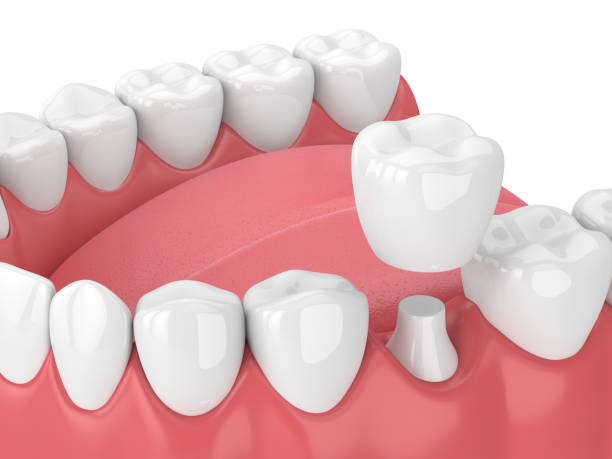Dental Crowns: A Simple Solution for Damaged Teeth
Dental crowns, also known as “tooth caps”, are a common product used in restorative dentistry. Tooth crowns are designed to protect natural teeth and prevent decay. While some tooth restorations are more obvious than others, dental crowns are virtually indetectable. A simple installation will restore the tooth’s shape, size, strength and appearance. The procedure is non-invasive and is typically completed in 1-2 quick appointments. If you’re looking for a simple way to protect and restore damaged teeth, dental crowns could be the solution you’re looking for.
How can dental crowns help my teeth?
Tooth problems are quite common among children and adults. Dentists regularly treat patients with cavities, tooth decay and chipped teeth and offer restoration options for damaged teeth. Dental crowns are one of the more popular tooth restoration options. There are numerous benefits to capping a tooth, such as:
- Protection for weak teeth;
- Stability for a tooth with a large filling;
- Restored natural color;
- Support for dental bridge;
- Structure and stability for a cracked tooth;
- Normal shape;
- Cosmetic alteration;
If you have weak, cracked or chipped teeth, address these issues quickly before they require major invasive dental procedures.
Which dental cap is right for me?
When it comes to choosing a dental crown, there are a variety of choices. Some patients prefer a durable metal material, while others choose the more natural-looking porcelain option. There is no one-size-fits-all tooth cap; each kind provides different benefits.
Stainless Steel
Stainless steel dental crowns were much more common before the introduction of porcelain. Now, these crowns are often used as a temporary protective solution while your permanent crowns are designed in a dental lab. Some dentists recommend stainless steel dental caps for children, as they’re cost-effective and only require one visit for an installation.
All Metal (Gold or Alloy)
A number of metals can be used in dental crowns, including gold, platinum, cobalt-chromium and nickel-chromium alloys. These crowns are the most durable, and rarely chip or break. While the durability is impressive, all metal crowns can be expensive due to the price of gold. If you’re considering this type of crown, they’re best used on out-of-sight molars where the metallic color isn’t as visible.
Porcelain-fused-to-metal
The combination of porcelain and metal offers a strong base and a natural appearance. The color of the porcelain can be adjusted to match your natural teeth. Although this sounds like the perfect crown, its drawbacks include increased wear on opposing teeth. In addition, porcelain can sometimes chip or break off, requiring additional dental work.
All Resin
Resin dental caps are the most affordable option available. These crowns tend to wear down faster, and are prone to fractures because the material isn’t as durable. However, they still protect your teeth and help prevent tooth decay.
All Ceramic
If you’re searching for a natural-looking tooth restoration, look no further. All ceramic crowns can be customized to look exactly like your natural teeth. They’re a safe, suitable alternative for anyone with metal allergies and can be used on front or back teeth.
Dental crown installation process
Dental crowns are usually installed over two visits. During the first appointment, the dentist numbs the surrounding area of the tooth and gum tissue. Then, he reshapes the tooth to provide room for the crown. If part of the tooth is missing, the dentist may build up the remaining tooth with filling material. Next, the dentist takes an impression of the tooth with paste or putty and sends it to the dental lab. Typically, it takes two to three weeks to make a permanent crown. In the interim, dentists use temporary crowns to prevent bacteria from infecting the tooth. During the second appointment, the dentist administers a local anesthetic to reduce any pain or sensitivity. Then, he tests, fits and installs the permanent crown. Some patients experience tooth sensitivity or discomfort after the anesthesia wears off. Dentists recommend toothpaste for sensitive teeth for relief. If a crown chips, falls off or breaks loose, contact your dentist right away to address the issue and prevent build up of bacteria.
When will I need to replace my dental crowns?
Like most restorations, tooth crowns do need to be replaced. Typically, they last between 5-15 years depending on the materials and wear. With proper dental hygiene and good care, crowns can last two decades or more. To prolong the life of your dental cap(s), avoid chewing ice or hard foods, biting fingernails and using your teeth as tools. Make sure to brush your teeth two or three times a day, floss daily and use a night guard if you struggle with grinding or clenching.
Dental caps will complete your smile
If you have a chipped, cracked or misshapen tooth, dental crowns could be the solution for you. Don’t wait to address these issues; they can lead to larger problems such as tooth decay or infection. To learn more about dental caps, call 702-852-2244 or schedule a consultation today.
